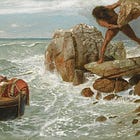Strategy in Turbulent Times
A Personal Quest
An Exploratory Journey
Over the last year, I have quietly embarked on an intellectual journey. Not a trip to distant lands, but a search for answers to a lingering question: how do I remain relevant in an increasingly turbulent world? A world in which AI systems are becoming more intelligent at breakneck speed, geopolitical relationships are shifting, climate change becomes increasingly urgent, and social structures are fundamentally changing.
This question marked the beginning of an intriguing journey through a landscape of books, articles, conversations, and reflections on strategy, human value, and meaning. What has always fascinated me is how people make decisions and what influences them. How is it that seemingly minor decisions can have far-reaching consequences, both positive and negative?
In recent years, I've wrestled with existential questions. Who am I ? What really matters to me? What am I supposed to do with my life? This struggle was intense, especially given the backdrop of global uncertainty and a period of unemployment. This personal quest prompted me to look deeper into the larger patterns underlying our decisions and strategies.
During my personal search, I came across Viktor Frankl's "Man's Search for Meaning," which, along with Dirk De Wachter's work, fundamentally altered my perspective. Frankl's realization that there is no universal meaning of life, but that meaning emerges from our reactions to what life brings, was a revelation. De Wachter beautifully adds to this by stating that "the meaning of life manifests through the other" - meaning, emerges through connection and engagement with someone else.
The Heart of the Matter
The fundamental existential questions I struggled with - who am I, what do I want to accomplish, and how do I act in an uncertain world - are essentially the same questions that underpin any genuine strategic consideration. What is strategy if not determining a meaningful path through fundamental uncertainty? Making deliberate decisions when the future is uncertain? Working with limited resources while faced with seemingly limitless opportunities and challenges?
My investigation began with a fundamental question: what does strategy actually mean? The term strategy is frequently used in boardrooms, innovation labs, and organizational strategy sessions. But how much substance do all of these strategic statements, vision documents, and transformation plans have?
What struck me was the abundance of what philosopher Harry Frankfurt refers to as "bullshit" - not necessarily lies, but words that are unconcerned about truth. In his influential essay "On Bullshit," Frankfurt makes a critical distinction: whereas a liar acknowledges the truth but deliberately deviates from it, a 'bullshitter' is completely unconcerned about whether something is true or false. It is not about truth or falsehood, but about producing a specific effect on the audience.
This pattern of bullshit appears everywhere, as André Spicer demonstrates in "Business Bullshit." It thrives in environments characterized by institutional pressure, increasing complexity, the pursuit of legitimacy, and a growing gap between rhetoric and practical reality. Together, these elements create an ideal breeding ground for meaningless but impressive-sounding language.
If you want a proverbial deep dive into bullshit , I covered the topic extensively in an earlier substack:
This phenomenon is not unique to business. In politics and the mainstream media, we see an alarming increase in bullshit that appears to undermine the functioning of democracies. Complex social issues are simplified into one-liners, and policy proposals are frequently used to impress voters rather than to address problems. The growing gap between (political) promises and tangible results breeds cynicism and distrust among citizens. Instead of substantive democratic deliberation on difficult decisions, we are increasingly witnessing a political spectacle in which appearance appears to be more important than content - an issue I will explore further in my upcoming essays.
In an era of unprecedented complexity and uncertainty, such as our current reality, this pattern only strengthens. What’s the result? A world where it is becoming increasingly difficult to cut through the noise and make thoughtful, significant choices and decisions, both in organizations and in our democracies.
'Strategic bullshit' is characterized by vague, meaningless statements, a lack of real choices, an emphasis on goals without means, and an abundance of impressive-sounding jargon. Spicer demonstrates how these language games thrive in modern organizations, creating an environment in which words lose meaning and deep strategic thinking gives way to superficial formulas.
The essence of authentic strategy, as I discovered, is fundamentally different. It is defined by Richard Rumelt in "Good Strategy / Bad Strategy" as follows: "a coherent argument that identifies critical challenges and describes a way to address them." It entails a sharp assessment of reality, making difficult trade-offs (what Michael Porter calls "the essence of strategy: choosing not to do certain things"), and developing a coherent action plan that is adaptable to changing circumstances.
This distinction between strategic bullshit and authentic strategy served as the foundation for my research. Because navigating a world of converging crises requires more than impressive-sounding but hollow formulas. We need a substantial, meaningful strategy that not only provides direction but also promotes human flourishing.
An Historical and Philosophical Exploration
In order to gain a better understanding of what strategy means in today's world, I looked back in time. The history of strategic thinking was surprisingly rich in useful insights. From Odysseus' ingenuity to Sun Tzu's indirect approach, from Machiavelli's ethical dilemmas to the complex considerations of the nuclear age, great strategic thinkers provide wisdom that is remarkably relevant today, particularly in this era of artificial intelligence and increasing complexity.
However, historical perspectives alone are insufficient. To truly understand how we can navigate our current situation, I had to map the converging waves of transformation that are reshaping our world: technological revolutions, geopolitical shifts, environmental challenges, socio-demographic transitions, and, perhaps most fundamentally, a growing crisis of meaning.
All of this led me to an unexpected insight: perhaps our time's most pressing strategic challenge is existential rather than technological, economic, or geopolitical. How do we preserve and create meaning in a world where machines can increasingly perform tasks that were previously thought to be exclusively human? How do we navigate converging transformations' practical complexity as well as their existential dimension?
A New Strategic Compass
Initially, I envisioned this exploration as a book. However, as the insights accumulated and my WirWar substack developed, I realized that this material could already be shared as a series of essays. The urgency of the questions I'm investigating grows by the day, so why wait?
In the next three weeks, I will publish my trilogy of essays, documenting my journey:
From Odysseus to AI: The Evolution of Strategic Thinking in an Age of Intelligent Machines
A journey through the history of strategic thinking and the surprising relevance of ancient wisdom in the age of artificial intelligence.The Five Waves of Transformation: A Strategic Compass for Turbulent Times An exploration of the converging revolutions that combine to create a perfect storm of complexity, as well as how we can navigate within it.
The Crisis of Meaning: Strategy in the Age of AI
A look at the most profound challenge of all: how do we preserve and create meaning in a world where machines can increasingly do what was once considered exclusively human?
These essays provide no simple solutions or formulas. Instead, they prompt deeper thought about the nature of strategy, decision-making, and human value in a rapidly changing world. They combine historical wisdom, contemporary analysis, and philosophical reflection to provide a more complete picture of what it means to navigate strategically in turbulent times.
Will these essays eventually be compiled into a full-length book? That remains to be seen and frankly is not that important. But I'm hoping that in their current form, they already provide useful insights for anyone grappling with the same questions as me: how do we make thoughtful decisions in an increasingly complex world? In the face of accelerating change, how do we remain relevant and meaningful? How can we not only survive but thrive in these turbulent times?
In search of wisdom in a world that appears both more dangerous and more promising than ever before.
Stay tuned for Part I - From Odysseus to AI: The Evolution of Strategic Thinking in an Age of Intelligent Machines !





